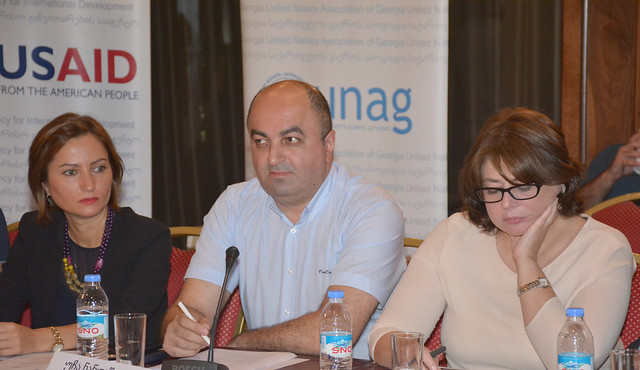Meeting on Engagement of National Minorities in Electoral-Political Processes
On September 19, 2016, the Public Defender and members of the Council of National Minorities of the Public Defender met with representatives of state agencies, the Central Election Commission and NGOs. Engagement of national minorities in the decision-making and electoral-political processes, the state vision on this issue and the existing situation were discussed at the meeting.
Public Defender Ucha Nanuashvili stressed the importance of filling the informational gaps through a dialogue. Petre Kankava, Deputy State Minister for Reconciliation and Equality Issues, said it was necessary to change stereotypes and attitudes in order to achieve more effective involvement of national minorities in the electoral-political processes. Importance of active engagement of national and religious minorities for the country’s development was mentioned in her speech by Tamar Sirbiladze, Head of the USAID/Georgia’s office for democracy, governance and social development.
Koba Chopliani, Coordinator of the Council of National Minorities of the Public Defender and member of the Tolerance Center of the Public Defender, noted that ethnic minorities are not appropriately involved in the country’s important events, discussions about the national minority issues or decision-making processes. He said that the low level of involvement was also evident in the fact that "only 2 political parties participating in the elections have included national minority issues in their programs and have representatives of national minorities in their so-called "winning” lists.
According to Ali Badirov, member of the Azerbaijani Bar Association, the low involvement of national minorities is conditioned by the lack of knowledge of the state language, as well as by the lack of encouragement policy for the educated youth who can speak the Georgian language.
Rima Garibiani, member of Akhalkalaki’s organization Open Borders, talked about the recent positive developments, reflected in the increased interest of the local population at pre-election meetings. She also pointed out that only one instead of two single-mandate constituencies have been left in Javakheti, which would negatively affect the involvement of national minorities in the decision-making process.
According to Bela Osipova, Executive Secretary of the Council of National Minorities of the Public Defender and member of the Tolerance Centre of the Public Defender, causes of the low engagement of female representatives of ethnic minorities in the political and electoral processes are: traditional views on gender roles, practice of early marriage, financial state of families, lack of knowledge of the state language in some cases and poor unavailability of information. However, according to her, the main problem in the country is the situation in terms of gender equality, unequal participation of women and men in the decision-making and political-electoral processes. Given all this, engagement of female representatives of ethnic minorities is linked to a double challenge, i.e. being a representative of a minority and being a woman.
Sophio Sichinva, representative of the Central Election Commission, spoke about the implementation of the Public Defender’s recommendations in 2015-2016. In particular, she said that the Commission trained high school students, including representatives of ethnic minorities, living in the regions on the importance of participation in the election processes; in addition, following the Public Defender’s recommendation, the Central Election Commission trained potential ethnic minority members of district election commissions; employed Armenian and Azerbaijani speakers in the call center and ensured dissemination of this information in the regions.
The part of the Council of National Minorities considers that apart from Azerbaijanis and Armenians, other smaller national minorities should also be involved in the decision-making process.
The Council of the National Minorities believes that the national minorities should be overall more significantly represented and involved in the discussions about the national minority and other issues, as well as various levels of the decision-making process and election lists. The Council members also noted that important part of national minorities can fluently speak Georgian and therefore, this cannot be any more considered as a hindrance to their participation in the decision-making process.
The event was organized by the Public Defender, the Council of National Minorities of the Public Defender and the Tolerance Center of the Public Defender, within the framework of the “Promoting Integration, Tolerance and Awareness” (PITA) program of the UN Association of Georgia (UNAG) that is funded by the US Agency for International Development (USAID).
















